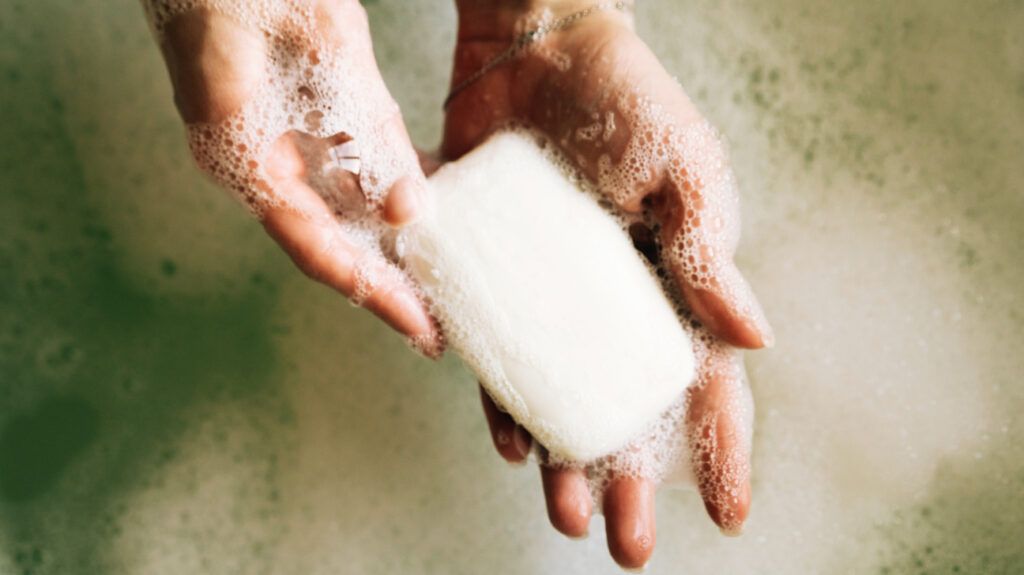Some soaps contain chemicals, including fragrances, that may harm health or cause skin irritation.
Soaps may contain certain chemicals to help the soap bind together, lather up, or add fragrance.
Some chemicals may affect health or irritate the skin, particularly if people have sensitive skin or conditions such as eczema.
This article discusses potentially harmful chemicals in some soaps, possible effects, and alternative options.

Not all soaps contain potentially harmful chemicals. Vegetable-based soaps, such as castile soap, may not contain harmful chemicals and have a low hazard score on the Environmental Working Group (EWG) Skin Deep database.
Natural soaps usually contain oils and fats from plants or animals as the main ingredients, without additional components such as preservatives, parabens, or binders.
People can look for soaps with short ingredient lists and those that do not contain:
- fragrances
- preservatives
- skin irritants
- chemicals that may affect health
Choosing a soap that does not lather may also be less irritating to skin conditions such as eczema.
Learn about making homemade soap.
Certain chemicals in soap
- linalool
- limonene hydroperoxides
- hydroxyisohexyl 3-cyclohexene carboxaldehyde
- treemoss absolute
- oakmoss absolute
- isoeugenol
- cinnamyl alcohol
- cinnamal
In some people, fragrances may cause reactions such as hives or photosensitivity, which is sensitivity to light.
The following sections discuss potentially harmful chemicals found in some soaps.
Formaldehyde
The EWG lists formaldehyde on its toxic chemical list. The following terms for formaldehyde may also appear in ingredient lists:
- paraformaldehyde
- methylene glycol
- quaternium 15, which releases formaldehyde
Formaldehyde is a
Triclosan
According to the
Triclosan may also affect how bacteria respond to antibiotics, possibly increasing the risk of antibiotic resistance.
Sodium lauryl sulfate (SLS)
SLS is a surfactant that can help cleaning products such as soap to foam and join ingredients together. According to the EWG, SLS may irritate a person’s skin.
According to the American Chemistry Council, SLS is not corrosive to the skin and is safe for use. No scientific evidence suggests SLS causes hair loss or is a carcinogen.
Dioxane
According to the
- PEG
- polyethylene
- polyethylene glycol
- polyoxyethylene
1,4-dioxane is a potential carcinogen to humans, although this requires further research.
Diethanolamine (DEA)
DEA
According to the FDA, an older study from the National Toxicity Program suggests residual levels of DEA may be carcinogenic. Still, it found no evidence linking DEA to cancer in humans.
The FDA does not believe there is a significant risk to humans due to DEA use in cosmetics.
The initials DEA may appear in an ingredients list, such as cocamide DEA, or as other ingredients which may contain DEA, such as:
- linoleamide MEA
- stearamide MEA
- TEA-lauryl sulfate
- triethanolamine
Phthalates
Phthalates
Phthalates may appear in an ingredients list simply as “fragrance” rather than as individual chemicals, such as dibutyl phthalate and diethylhexyl phthalate.
Dibutyl phthalate may damage the male reproductive system during development. Diethylhexyl phthalate may harm the reproductive system and a developing fetus and may be a potential carcinogen.
For washing, people may want to use water or make a homemade body scrub with simple ingredients, such as honey, coffee grounds, or oatmeal.
Soaps labeled “antibacterial”
The FDA advises that people do not need antibacterial soap for handwashing. Using plain soap and warm water is sufficient to help prevent germs and illness.
Read about the best soaps for eczema.
Some soaps may contain chemicals that can affect health or cause skin irritation.
People can look for short ingredient lists on soaps to minimize exposure to damaging chemicals. People may choose a certified organic or natural soap containing plant or animal ingredients without fragrances, preservatives, or additives.
